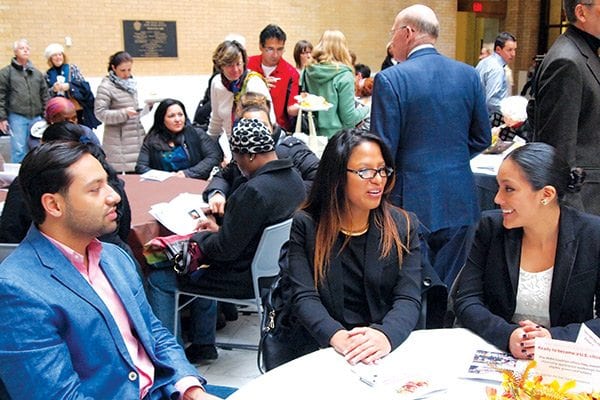

Massachusetts Immigrant and Refugee Advocacy Coalition Executive Director Eva Milona says President Obama could defer deportations until Congress approves immigration reform. The Obama administration has deported nearly 2 million undocumented immigrants, more than any previous administration.
In many ways, 2013 should have been a good year for immigration reform advocates. The Senate voted in June on immigration reform legislation that would grant the estimated 11 million undocumented immigrants currently in the U.S. temporary legal status and a pathway to citizenship within 13 years.
But despite numerous immigration reform overtures, like his offer last week to move on immigration reforms piecemeal, President Obama has run up against the same wall of GOP opposition that has blocked so many of his administration’s initiatives and nearly brought the federal government to a standstill.
One activist’s frustration with the immigration stalemate boiled over last week when University of California Berkeley student Ju Hong heckled Obama, who was speaking on immigration issues in San Francisco’s Chinatown neighborhood, urging him to stop deportations. As Secret Service agents moved in to remove Hong, the president stopped the agents, then spoke to the issue.
“If I could solve all the problems without passing laws in Congress, then I would do so,” Obama told Hong. “But we are a nation of laws. That’s part of our tradition. The easy way out is to yell and pretend like I can do something by violating our laws.
“What I’m proposing is the harder path, by using our democratic process to achieve the same goal that you want to achieve. But it won’t be as easy as yelling. It involves us lobbying and getting it done.”
In many ways, the lobbying campaign Obama called for in his speech has been underway for years. Activists have written letters, lobbied state and federal officials, held protests and used their personal stories to inform the national debate over immigration reform.
Renata Borges Teodoro, lead coordinator for the Boston-based Student Immigrant Movement, made national headlines with her story in June when she and other immigrant activists met family members at the U.S. Mexican border in Arizona. Photos of Teodoro and her mother, who traveled from Brazil for the meeting, tearfully holding hands and blocked from embracing by the bars of the fence, graphically illustrated the pain of separation.
“People talk about family separation, but don’t really know what it means,” she told the Banner. “I think it moved people, seeing us not able to embrace.”
Teodoro has received temporary resident status under the Obama administration’s Deferred Action program and can legally remain in the United States for the next two years. Her mother and brother, who were swept up when their home was raided by Immigration Customs and Enforcement in 2007, would risk a felony conviction if they returned.
In some ways, the efforts of activists like Teodoro have had an impact. According to a poll released last week by the Public Religion Research Institute, 63 percent of the U.S. public supports a path to citizenship for undocumented immigrants currently living here.
But the shift in public sentiment apparently hasn’t stemmed the tide of deportations. Immigration activists point to the Secure Communities Act, a Bush administration program that started in Texas and requires local and state police to detain immigrants arrested or detained in traffic stops and turn them over to Immigration and Customs Enforcement. The program was expanded during the Obama administration to every state in the U.S. Critics of the law say that ICE routinely deports immigrants who are not guilty of committing any crimes.
Despite a 2011 Department of Homeland Security policy memo calling for focusing limited public safety resources on deportation of dangerous criminals, incarceration and deportations of non-violent immigrants has continued apace.
In the first six months of 2011, the federal government pursued 18,552 new prosecutions for illegal re-entry, the crime of re-entering the U.S. after deportation, according to the Transactional Records Access Clearinghouse at Syracuse University. Illegal re-entry is now the number one lead charge federal prosecutors are lodging against all defendants.
In all, the Obama administration has been deporting 400,000 undocumented immigrants a year.
While the number of people caught crossing the U.S. border has declined in recent years, Secure Communities deportations and the number of ICE raids on workplaces and private residences have increased. Nearly 2 million undocumented immigrants have been deported during Obama’s presidency, more than during any previous administration.
Teodoro says the president could stem the tide of deportations by directing ICE to follow its own 2011 memo and devote its resources on dangerous criminals.
“He has the power to stop the deportation of millions of people,” she said.
Massachusetts Immigrant and Refugee Advocacy Coalition Executive Director Eva Milona notes that Obama could use his executive power as a bargaining chip with Congress.
“He has the power to issue an executive order to defer deportations until Congress acts,” she said.
Boston mayor-elect Marty Walsh said he will seek to have Boston opt out of the Secure Communities program, speaking during a MIRA Coalition event at the State House last week.
U.S. Rep. Michael Capuano says it’s unlikely Congress will pass the Senate’s bill this year, given the hardline stands many Republicans have taken.
“My concern is that they’ll gut it,” he said. “It’s an untenable position to suggest they should all go home. That’s not going to happen.”
Capuano said there’s a good chance immigration reform will pass next year. But it will require a more mature conversation about the nation’s priorities, he said.
“There has to be a thoughtful conversation about what this country needs,” he said. “How many people do we need and what skills they bring.”






